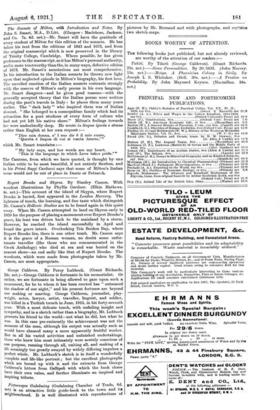The Sonnets of Milton, with Introduction and Notes. By John
S. Smart, MA., D.Litt. (Glasgow : Maclehose, Jackson, and Co. 7s. 6d. net.)—Mr. Smart will have the gratitude of every student of Milton for this edition of the sonnets. He has taken his text from the editions of 16I5 and 1673, and from the original manuscript which is now preserved in the library of Trinity College, Cambridge. Where possible; he has given preference to the manuscript, as it has Milton's personal authority, and is more trustworthy than the, in many ways, defective edition of 1673. Mr. Smart's annotations are most comprehensive. In his introduction to the Italian sonnets he throws new light upon that neglected episode in Milton's biography, his first love. The unveiled emotion of the Italian sonnets contrasts strongly with the reserve of Milton's early poems in his own language. Mr. Smart disagrees—and he gives good reasons—with the generally accepted theory that the Italian poems were written during the poet's travels in Italy : he places them many years earlier. The " dark lady " who inspired them was of Italian descent. " She belonged to a cosmopolitan family which had its attraction for a poet studious of every form of culture who had not yet left his native shore." Milton's feelings towards her were undoubtedly deep. He wrote in lingua ignota e straws rather than English at her own request :-
" Dice mia donna, e' I suo dir d it mio cuore, ' Questa b lingua di cui si vanta Amore,' " which Mr. Smart translates :- " My lady says, and her words are my heart, This is the language in which Love takes pride."
The Canzone, from which we have quoted, is thought by one Italian critic to be most beautiful, if not entirely flawless, and in his Primi Saggi Carducci says that some of Milton's Italian verse would not be out of place in Dante or Petrarch.


































 Previous page
Previous page